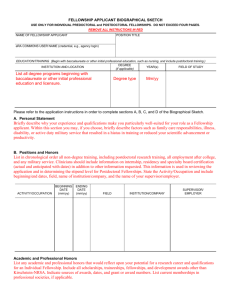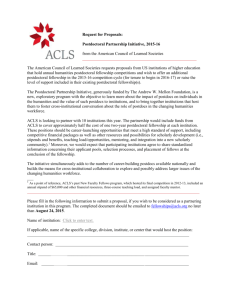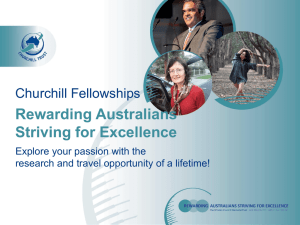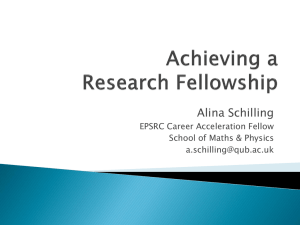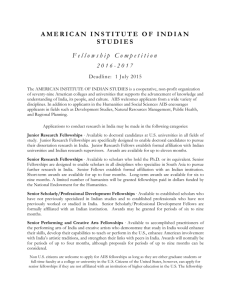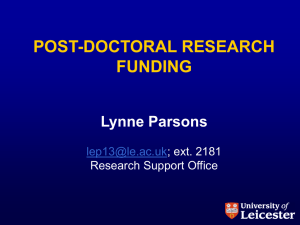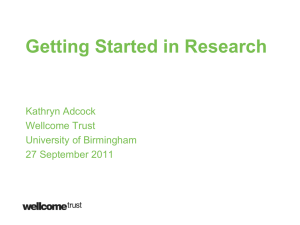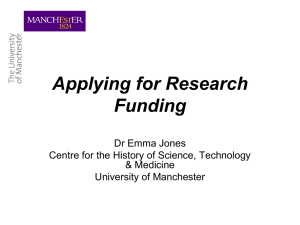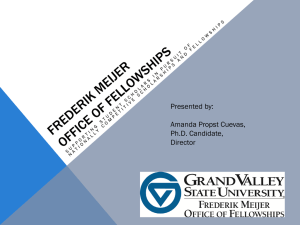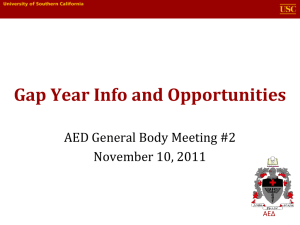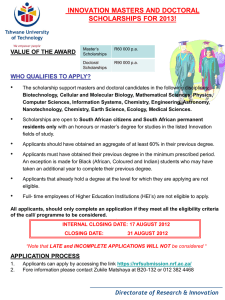ACLS African Humanities Program - American Council of Learned
advertisement
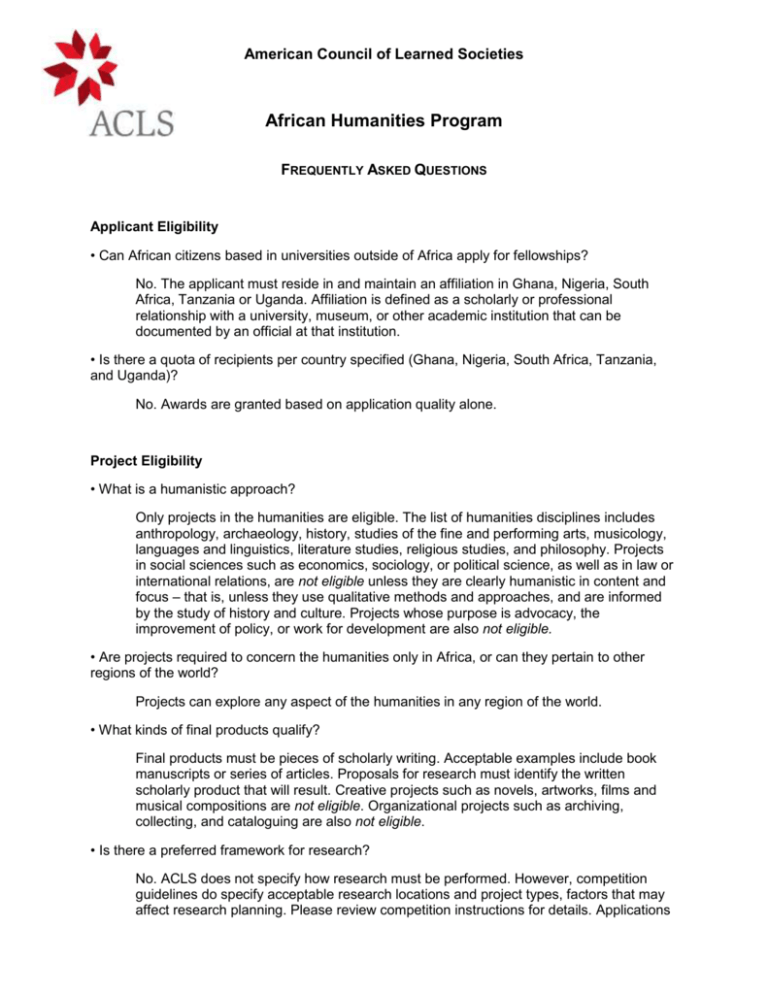
American Council of Learned Societies African Humanities Program FREQUENTLY ASKED QUESTIONS Applicant Eligibility • Can African citizens based in universities outside of Africa apply for fellowships? No. The applicant must reside in and maintain an affiliation in Ghana, Nigeria, South Africa, Tanzania or Uganda. Affiliation is defined as a scholarly or professional relationship with a university, museum, or other academic institution that can be documented by an official at that institution. • Is there a quota of recipients per country specified (Ghana, Nigeria, South Africa, Tanzania, and Uganda)? No. Awards are granted based on application quality alone. Project Eligibility • What is a humanistic approach? Only projects in the humanities are eligible. The list of humanities disciplines includes anthropology, archaeology, history, studies of the fine and performing arts, musicology, languages and linguistics, literature studies, religious studies, and philosophy. Projects in social sciences such as economics, sociology, or political science, as well as in law or international relations, are not eligible unless they are clearly humanistic in content and focus – that is, unless they use qualitative methods and approaches, and are informed by the study of history and culture. Projects whose purpose is advocacy, the improvement of policy, or work for development are also not eligible. • Are projects required to concern the humanities only in Africa, or can they pertain to other regions of the world? Projects can explore any aspect of the humanities in any region of the world. • What kinds of final products qualify? Final products must be pieces of scholarly writing. Acceptable examples include book manuscripts or series of articles. Proposals for research must identify the written scholarly product that will result. Creative projects such as novels, artworks, films and musical compositions are not eligible. Organizational projects such as archiving, collecting, and cataloguing are also not eligible. • Is there a preferred framework for research? No. ACLS does not specify how research must be performed. However, competition guidelines do specify acceptable research locations and project types, factors that may affect research planning. Please review competition instructions for details. Applications African Humanities Program FAQ, page 2 should state why the proposed research framework is the most appropriate for the research questions posed. • What kinds of projects are usually successful in AHP fellowship competitions? Does ACLS provide examples of winning proposals to potential applicants? ACLS does not provide examples of winning proposals, and there is no one model to follow for a successful application. However, applicants may view abstracts of winning proposals online at Fellows & Research. (These are updated each summer.) • Are fellowships available to scholars completing Master’s degrees? No. ACLS Fellowships are intended for scholars completing work at or beyond the Ph.D. level. • What is the appropriate timeframe for project completion? Applications should propose work that can be completed within a one-year period. If the work is part of a larger, multi-year project, the applicant should state this and should identify the activities that will be supported by AHP funds during the fellowship period. Dissertation-completion Fellowships • Are applicants involved in “sandwich,” extended study, or study abroad programs of universities outside of Africa eligible to apply for dissertation-completion fellowships? No. Such applicants will only become eligible when they have returned to, and are in residence at, the African institution with which they are affiliated. • How many dissertation-completion fellowships are granted each year? Does that number depend on the number of applications submitted in that year? The total number of dissertation-completion and early career postdoctoral fellowships ranges from 35 to 50. The number of awards depends on the quality of the applications, not on the total number of submissions. Postdoctoral Fellowships • What kinds of final products should applications for postdoctoral fellowships propose? Applications should propose scholarly research projects that will lead to publication of a monograph or other scholarly product. Professional projects such as textbooks and course planning are not eligible. Journalistic accounts and popularizations are also not eligible. • Are collaborative projects eligible for postdoctoral fellowships? No. Postdoctoral fellowships are intended for scholars working alone. • Can postdoctoral fellowships be used to revise one’s dissertation for publication? African Humanities Program FAQ, page 3 Yes. This is encouraged. However, the applicant must clearly state what sort of work will be involved in revisions – e.g., writing only (specify which chapters), additional research, library or archival searches, etc. • How many postdoctoral fellowships are granted each year? Does that number depend on the number of applications submitted in that year? The total number of dissertation-completion and postdoctoral fellowships ranges from 35 to 50. The number of awards depends on the quality of the applications, not on the total number of submissions. Application Review Process • Should the bibliography be included in the two-page application essay or should it be placed on additional pages? Is there a particular citation method that is preferred? The review essay can mention a few key works that have guided formulation of the research question or the choice of approaches and methods. But the essay is not the place for a literature review. The place for such a review is the page on the application form titled: VI. Bibliography and Sources All standard methods of citation are acceptable. • If my application is delayed due to unforeseen circumstances, can it still be considered? No. Late applications are never accepted, regardless of circumstances. It is the applicant’s responsibility to begin preparing the application early enough to allow time for proper transmission to ACLS. • Who will review the applications? Each application is reviewed by two senior faculty members teaching at African institutions. To ensure the highest international standards in evaluation, and to prevent potential conflicts of interest, no application is reviewed by someone from the same country as the applicant. • How long does the review process usually take? Decisions are usually announced approximately five to six months after the competition deadline. • Will I get comments back from the reviewers? If not, may I request feedback? There is no guarantee that applicants will receive feedback, but they may request comments after decisions are announced. • If I was turned down in a prior AHP competition, is it worth my time to apply again? Yes. Individuals may apply as many times as they wish and are especially encouraged to resubmit if they have received letters suggesting that they reapply. Before reapplying, applicants should seek the advice of colleagues and mentors regarding the substantive content as well as the presentation of their applications. Applicants should weigh any advice they receive, but the final version of the application’s content as well as its final written form should be the applicant’s own work. African Humanities Program FAQ, page 4 Award Utilization • If I finish my project more quickly than anticipated, can I use the remaining time for another project? Yes. It is acceptable to use extra time for the preparation of additional material for publication or for conducting further research. However, applications proposing work that can clearly be accomplished in much less than a year’s time will be given a lower priority. • Can fellowships be deferred? No. Fellowships must be completed within the period specified by the applicant in the application. These periods must match the timeframes of the annual competition for which they were submitted. • Are stipends paid directly to the fellow or are they paid through the payroll system of their home or host institution? Stipends are paid directly to fellows without institutional involvement. However, the appropriate official at the institution is informed of the fellowship. • Are applicants who have been offered simultaneous fellowships from other sources eligible to accept ACLS fellowships? No. ACLS fellows may hold no other simultaneous scholarships or grants. American Council of Learned Societies | 633 Third Avenue, 8th floor | NY, NY 10017 African Humanities Program | www.acls.org/programs/ahp | ahp@acls.org
